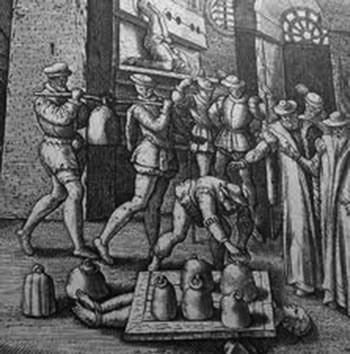| ST. MARGARET CLITHEROW | ||
| Feast / UK: 30 August | ||
| Margaret Clitherow, born in Yorkshire, England, was the wife of John Clitherow, whose family was Catholic, although he had taken on the state religion of England long before he married. Two or three years after her marriage, Margaret became a Catholic. Her home became a stopping-off place for priests, and Mass was offered secretly there.Her husband went along with her interests, even when she sent their oldest son to Douai, in France, to be educated. Not only was she devout, she was also a zealous promoter of the faith, converting others and bringing back backsliders to the practice of their religion. Meanwhile, the laws against the Catholic faith became more harsh, and the. government was determined that Catholicism should be stamped out in Yorkshire where it was especially strong. Everyone loved St. Margaret Clitherow, and even her servants knew that she hid fugitive priests, but no one betrayed her. She was a good housewife, capable in business, dearly loved by her husband, whose only regret was that she would not attend church with him. Her husband was summoned by the authorities to explain why his oldest son had gone abroad, and the Clitherow house was searched. A Flemish boy, from fear, revealed the hiding place of the priests where chalices and vestments were kept. Margaret was arrested along with a neighboring housewife who had attended Mass at the Clitherow home. Margaret's only concern was that her family was safe. She was brought to trial and would not plead, her only statement being, "Having made no offense, I need no trial." If she had been tried, her family would have been called as witnesses against her, and she was determined that this would not happen. Reluctantly, the judge sentenced her to be "pressed to death," a bizarre death sentence in which the condemned was placed under a door (or similar object) and rocks piled on the door until the person was crushed to death. Margaret died on March 25, 1586, her last words being, "Jesu, Jesu, Jesu, have mercy on me!" She was only thirty years old and was canonized in 1970. Thought for the Day: Through everyday fidelity we are given the strength to face the great crisis. St. Margaret Clitherow did not expect to die a martyr, but she was faithful in the everyday practice of her religion. When the great crisis came, she was ready. From 'The Catholic One Year Bible': "A tree from good stock doesn't produce scrub fruit nor do trees from poor stock produce choice fruit.... A good man produces good deeds from a good heart. And an evil man produces evil deeds from his hidden wickedness."—Luke 6:43-45 Taken from "The One Year Book of Saints" by Rev. Clifford Stevens published by Our Sunday Visitor Publishing Division, Our Sunday Visitor, Inc., Huntington, IN 46750. | ||
Provided Courtesy of: |

An outspoken critic of the military regime during El Salvador's bloody civil war, Archbishop Romero was shot dead while celebrating Mass in 1980.
Beatification, or declaring a person "blessed", is the necessary prelude to full sainthood.
The bishop was one of the main proponents of Liberation Theology - an interpretation of Christian faith through the perspective of the poor.
'Death squads' On Monday, the Pope said he was hoping for a swift beatification process.
"For me Romero is a man of God," the pontiff told journalists on the plane bringing him back from a trip to South Korea.
"There are no doctrinal problems and it is very important that [the beatification] is done quickly."

It seems Francis hasn't finished wielding his new broom at the Vatican just yet, despite being Pope for more than a year now. After peering into the dark corners of the Vatican's banking system, and pushing an inclusive brand of Catholicism, he's now tackling what's been a painful episode for many Catholics.
Francis's decision to send the case of the Archbishop Romero to the Vatican's saint-making office flies in the face of what his two predecessors advocated. Indeed, Francis's own instincts early on in his Church career also tended to be suspicious of Romero's Liberation Theology, preferring clerics to steer away from political analysis and advocate salvation through prayer instead.
Yet many Catholics have been puzzled as to why a man killed for standing up for the Poor, has for so long been ignored by a Church which claims to speak for them. The Pope's comments don't mean he's changed his mind on Liberation Theology but may be an acknowledgment that, for many Catholics, Oscar Romero is already a saint - in practice, if not in name.

Left-wing rebels fought an insurgency against the US-backed right-wing government.
Some 75,000 people were killed in the civil war, which began in 1980 and ended in 1992 with a UN-brokered peace agreement.
Archbishop Romero was killed on 24 March 1980, aged 62, after ending his sermon in the capital, San Salvador.
No-one has ever been convicted in connection with his murder.
In 2010, then President Mauricio Funes - El Salvador's first left-wing leader since the end of the civil war - made an official apology.
"I am seeking pardon in the name of the state," Mr Funes said as he unveiled a mural honouring Oscar Romero at El Salvador's international airport.
The archbishop, he said, was a victim of right-wing death squads "who unfortunately acted with the protection, collaboration or participation of state agents".













